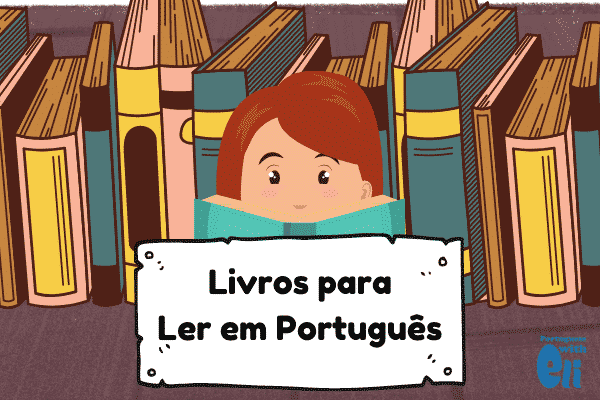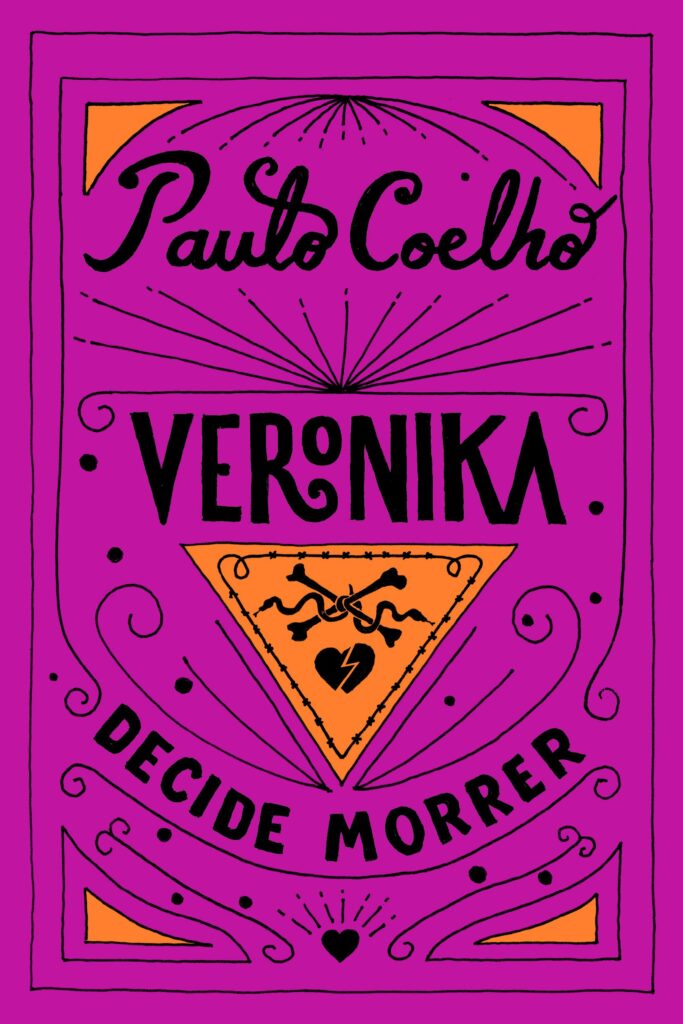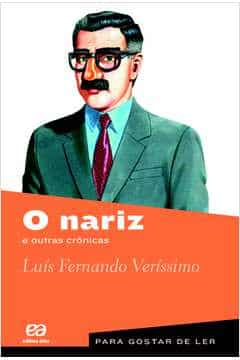Books to Read in Portuguese – Start Today, for Beginner and Intermediate Levels

One of my professors at college said it was impossible to teach languages through literature.
The problem is he was teaching a literature course. It was English language and literature. Horrible.
But I’m not here to talk about him. I’m here to talk about books — easy books to read in Portuguese that and adventures beginner and a confident intermediate learner can start reading today.
Portuguese Reading Books for Beginners?
If by beginner we say someone who has at least 40 hours of study under their belt, then we are talking about an experienced beginner.
If you are a true beginner, you won’t feel comfortable reading the suggestions that I have here. And it’s not because they are unpleasant — it’s just that they include so much vocabulary that you’ll feel like looking up every other word in the dictionary.
If you are a true, true beginner, I suggest you stick to materials produced especially for you — like the texts we offer for you for free on Read Brazilian Portuguese. It’s our sister website that includes lots of reading materials focused on true beginners and upper beginners — and even some intermediate students benefit from our podcasts because they are tailor-made for learners of Portuguese as a foreign language.
But if you’re feeling a little bit more adventurous, I suggest you grab our free Portuguese graded reader. It’s been adapted and written specifically for you, beginner learner with about 40 hours of study under their belt. You can try it for size, and if you don’t like it you didn’t spend a penny.
Additionally, you can check some Brazilian Portuguese children’s books. They can help you ease your way into your reading journey.
Easy Books to Read in Portuguese
The books and the following list were chosen following took criteria:
- accessibility of vocabulary, and
- level of register of the vocabulary.
As for the first criterion, the vocabulary has to be immediately accessible for most speakers who are just beginning their reading journey in Portuguese. I’m taking into consideration native speakers who have never read anything and are just starting out. As I said elsewhere, Brazilians are not big readers, and as such easy books for us are crucially important.
And speaking of the second criterion, I want to choose books that are more informal in nature. Of course, you should move on to high literature whenever you can — it’s not only an intellectual exercise but also a way to see how far you can stretch the structures of the language. But we don’t want to face that big of a hurdle at the beginning.
Now, with those two things in mind common let’s take a look at the list of good books to read in Portuguese.
Recommendation of Non-fiction
1808, by Laurentino Gomes

With the provocative subtitle “how a crazy queen, a cowardly prince and a corrupt court fooled Napoleon and changed the history of Portugal and Brazil,” 1808 (this is an affiliate link, and I may make a small commission if you purchase through this link, with no cost to you) is one of the most accessible history books written in Brazilian Portuguese.
In it, you’ll see how the coming of the Portuguese to Brazil in 1808 influenced the country we became today and what Portugal has become as well.
The author is a journalist and as such has a very down-to-earth writing style. Even so, he published his book in two versions — one for adults and another for young people (the Portuguese word for that is “edição juvenil”). The biggest difference is the level of detail that the author includes in both, but by acquiring the simpler version you will not be missing out on anything. In fact, you’ll have lots of pictures, illustrations, and precise descriptions that use fewer words that are more accessible.
You may find this read challenging, but if you like nonfiction and are kind of a history buff, then your motivation will carry you along.
Recommendation of Fiction
Veronika Decides to Die, by Paulo Coelho

The plot is exactly what the title says — one day a woman named Veronika decides to die (this is an affiliate link, and I may make a small commission if you purchase through this link, with no cost to you).
I simply love the premise even though I have my quibbles with the development of the story. And that’s my problem with Paulo Coelho.
By the way, you may know someone who says Paulo Coelho is trash. Well, in my humble opinion he is as trash as a McDonald’s burger is trash — perhaps bad for your health but sometimes necessary for your happiness.
The biggest criticism people have about Paulo Coelho’s books is that he’s not literary enough. So much so that this journalist came up with a list of arguments why you shouldn’t read Paulo Coelho’s books. In life we can find arguments to justify anything — the problem is, will people accept these arguments?
Leaving those feuds aside, I suggest you read Paulo Coelho not for his literary merit but rather because he has such an easy and accessible Portuguese that even if you are reading his books for the first time you will find the stories intriguing in the vocabulary easy-to-understand.
And eventually you will reach a level advanced enough for you to leave Paulo Coelho’s books behind and find something much more to your taste — supposed you don’t like him.
O Nariz, from the Coleção “Para Gostar de Ler”

Luis Fernando Verissimo has written numerous texts since the beginning of his career as a journalist and writer. The genre of the texts he writes is called “Crônica.” It’s hard to define it, but usually, it’s a short text about something that happened on the day the writer wrote the text. It can be fiction or nonfiction, based on the writer’s experiences, or on their recollections of an event. It may even be a commentary on the goings-on in the field of politics (like in the excellent book Aquele Estranho Dia que Nunca Chega – link for reference).
O Nariz (Amazon Brazil, not an affiliate link – just for reference) is one of the stories in that anthology. It’s about a doctor who decides to wear a funny disguise with a nose, glasses, and eyebrows that made him look like Groucho Marx. The problem is he wears it even at work, much to his family’s dismay. It’s a story of resistance and conformity, but with a funny development.
What I like in this book is that you can pick out any sentence in the book and use it immediately in a conversation. Some are idiomatic and require a good dose of cultural knowledge to be employed effectively. But this book is a gem, the stories are short, and the patient reader can read one story every week or if they are feeling quite motivated, one a day.
And where can you find those books to read in Portuguese?
It depends on where you are.
If you’re in Brazil you want to use two sources:
Estante Virtual
Estante Virtual used to be a small company but it was bought out by a bigger company called Livraria Cultura.
The now parent company also sells books online but they tend to be more expensive. At Estante Virtual you can find books that are out-of-print and classical books at a very affordable price.
My working library is composed mostly of books bought from Estante Virtual.
If you’re in Brazil and you want to buy books from Estante Virtual you want to take into consideration that the books are shipped by a common carrier — the dreadful Correios. Sometimes they deliver things in time. In my experience, it has happened at least in 70% of the cases. But when the employees go on strike you will not see the product so soon.
Amazon
Of course, the giant destroyer of small bookstores is a reliable source of good books in Brazil. If you are a subscriber of their Prime service, you’ll see your books in one to five days of purchase. And when they don’t have the book themselves some small seller who uses Amazon marketplace might have the book.
And how can I find books to read in Portuguese if I am outside of Brazil?
Depending on the country you are you may be lucky enough to see a Portuguese bookstore near your house. I know that in Luxembourg there is one such bookstore.
But if you are in the United States, in addition to Amazon, you can check Thrift Books. It’s a bookstore that sells secondhand books. They have a good inventory and many of my students who live in the US have found the books that they look for at Thrift Books. The prices are affordable, the shipping is fast, and the service is very good.
In fact, even though I don’t live in the US I purchased books from them and whenever I did so I received my books.
But what if I don’t have that much money to spend on books?
Sometimes we don’t have the budget — and that’s okay. In that case, you’ll need to invest a little bit more time to find Portuguese books to read online.
One good source I recommend is Domínio Público (only in Portuguese), a government project that makes available classical works that have gone into the public domain. Of course, most of it will feel old — they are the classics, and they haven’t been reviewed. So you’ll find old spelling sometimes. But you find all the classics you need there.
If you prefer audiobooks, I recommend you search for some books in the Librivox catalog. Again, it’s public domain work but in an audio version. Volunteers record the books so some recordings will be more professional than others. I have used Librivox books myself when learning English and they have been quite helpful.
Wrap up
So, do you have any book recommendations? Leave it in the comments below!
And this has been a preliminary discussion. I could list lots and lots of books, but I decided to give you a starting point. Tell me the comments below if you need a book recommendation — tell me your favorite genre, liked authors, and kind of story you would like to read, and I or someone else will certainly come up with a good suggestion for you.
And, of course, you can check our book catalog as well — with books for the Intermediate Level.





